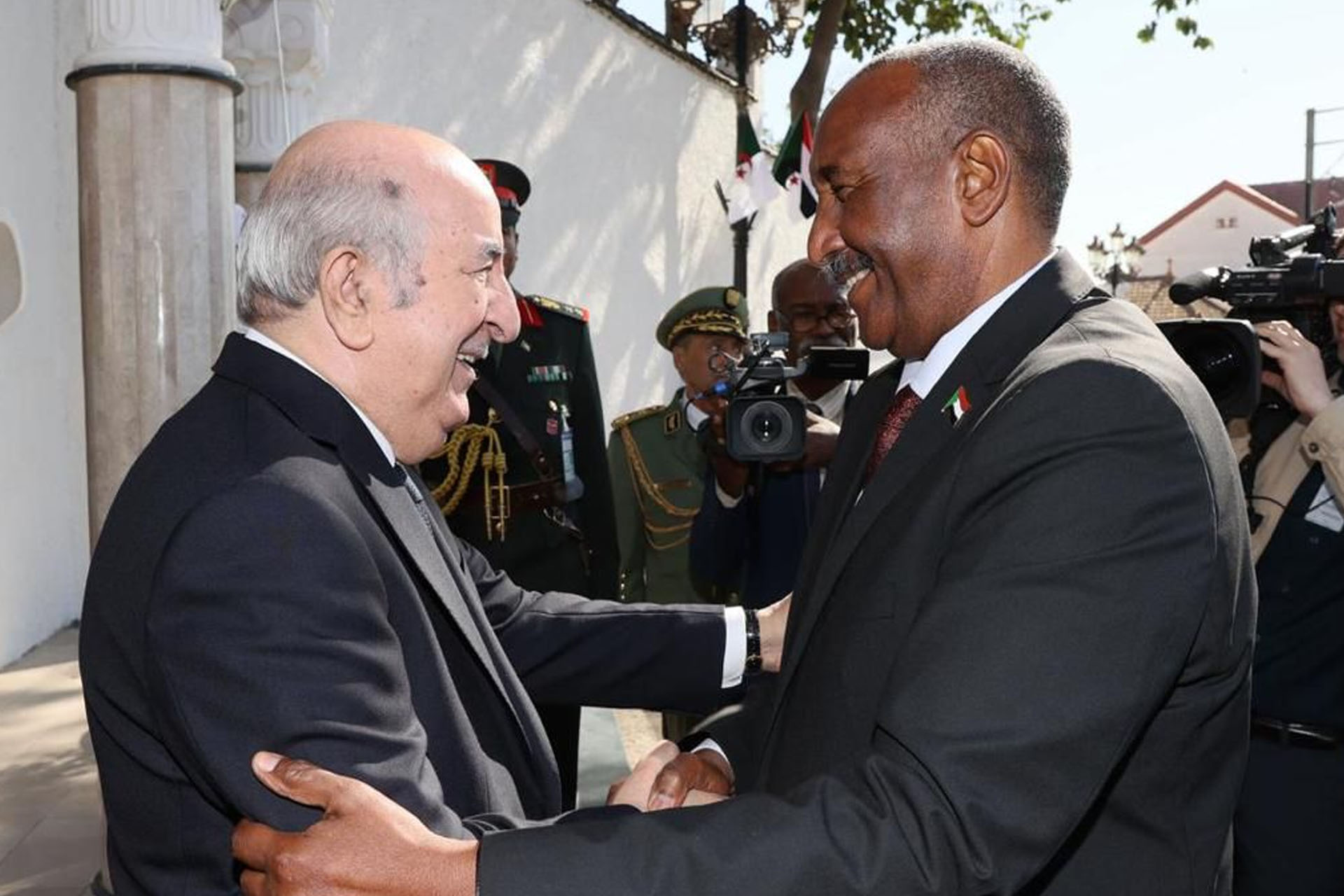Al-Burhan (right) stressed Sudan’s welcome of any Algerian role that contributes to addressing the crisis in Sudan (SUNA)
Khartoum -
After the faltering of African efforts, and the stagnation of the Jeddah platform for negotiations between the Sudanese army and the Rapid Support Forces, the Algerian leadership entered the Sudanese crisis line following the visit of the President of the Sovereignty Council, Abdel Fattah Al-Burhan, to Algeria, and receiving pledges from President Abdelmadjid Tebboune to “play an active role.” Africa And internationally to stop the war in his country.
Al-Burhan and Tebboune held talks yesterday, Monday, in Algeria, which focused on developments in the Sudanese crisis, the steps taken since last May to stop the war, the security and military conditions in Sudan, and the suffering of the Sudanese due to the continuation of the war, which has exceeded 9 months.
An advisor to the Sovereignty Council told Al Jazeera Net, “Algeria will not propose a new initiative, but it will make international and regional efforts to accelerate efforts to end the war in Sudan, especially since it has become a member of the UN Security Council, in addition to its active presence in the African Union, as it is the third largest financier of the Union after Egypt and South Africa.
The advisor - who requested to remain anonymous - explains that Algeria believes that the Jeddah platform has come a long way in the humanitarian files and security arrangements, and needs international and regional support to revive and complete it, and adds that “Algeria does not mind hosting a meeting between Al-Burhan and the Rapid Support Commander, Mohamed Hamdan Dagalo.” (Hemedti), to advance the negotiation process if the parties agree to this, after the failure of the Intergovernmental Authority for the Development of East Africa (IGAD) and the suspension of Sudan’s membership in the organization.
Head of the Sovereignty Council Abdel Fattah Al-Burhan (left) on a diplomatic visit to Algerian President Abdelmadjid Tebboune (SUNA)
Rejection of foreign intervention
The UN Secretary-General's envoy to Sudan and former Algerian Foreign Minister, Ramatane Lamamra, commented on Al-Burhan's visit to Algeria in a tweet, "Thank you, President Tebboune, for his support of the United Nations' efforts to overcome the difficult ordeal that Sudan is going through, which is heading in an escalating direction as a result of foreign interventions."
President Tebboune affirmed that Algeria stands with Sudan “to overcome the difficult circumstances and confront the forces of evil that are targeting it.” He said during a press conference with Al-Burhan that “Algeria has and continues to prefer resolving conflicts with a purely internal vision, far from all forms of foreign interference,” stressing that “ The first and last word always belongs to the Sudanese people with all their components.”
The Algerian President reiterated that his country will work, during its membership in the UN Security Council, to support just causes on the African continent and the world, and to reduce the impact of conflicts and tensions that have become a threat to the stability of countries and the reassurance of peoples.
For his part, Al-Burhan said, “Sudan is being subjected to a conspiracy with the complicity of regional and international partners,” expressing his happiness that Algeria will be present at any Arab or regional discussion or negotiation table, stressing that Sudan welcomes any Algerian role that contributes to addressing the crisis in Sudan.
Conditions for meeting proof
Advisor to the Rapid Support Commander, Muhammad Al-Basha Tabiq, believes that Al-Burhan’s visit to Algeria comes to request diplomatic and military support, after he lost his regional environment. After accusing neighboring Sudanese countries of supporting the Rapid Support Forces and providing them with diplomatic and political cover.
Speaking to Al Jazeera Net, Tabik said that if Algeria presents a serious initiative to contribute to resolving the Sudanese crisis, in coordination with the Jeddah Platform and IGAD, they will deal with it.
Regarding a possible meeting between Al-Burhan and Hemedti in Algeria, the advisor says, “The meeting between the two men depends on the presence of leaders of IGAD countries, and representatives of the United States, Saudi Arabia, and the United Nations, to ensure any understanding or agreement between the two sides.”
Balance of power
Political researcher Mubarak Othman believes that Al-Burhan's visit to Algeria aimed to create a balance, after the leadership of the Rapid Support Forces, through the regional powers behind it, was able to gain the support of some leaders of the IGAD countries and other African leaders.
According to what the researcher told Al Jazeera Net, Algeria, through its membership in the Security Council, can support the Jeddah platform and give it an international boost. It also has long-standing influence in the African Union that enables it to play a positive role and prevent the Union from being used for the benefit of any party.
The same researcher explains that Algeria has good relations with the social components in the African Sahel countries, some of whose sons are fighting with the Rapid Support Forces, and can convince its figures not to get involved in the Sudanese conflict, so that there are no political or security repercussions that threaten the stability of their countries.
Mubarak Othman believes that Algeria will not propose a new initiative regarding the Sudanese crisis, but rather strengthen the ongoing efforts. He says that it “pursues quiet diplomacy and communication through back channels, and is respected in the region, which makes its diplomatic movements and contacts effective and productive.”
The same spokesman adds that the history of relations between Sudan and Algeria, extending for about 61 years, the mutual respect between the two countries and the friendliness between the two peoples, helps the Algerian leadership to play a positive role in resolving the Sudanese crisis.
Sudan had provided political and logistical support to the revolutionaries of the Algerian National Liberation Front, during their armed struggle against the colonialists, and Khartoum hosted the Algerian Liberation Front, which opened an office there in 1957.
Source: Al Jazeera

